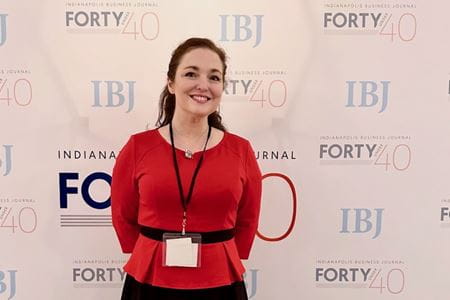IU School of Medicine’s Geddes named to IBJ’s 2023 Forty Under 40
When Gabrielle “Elle” Geddes, MD, learned she had been named to the Indianapolis Business Journal’s 2023 Forty Under 40, her immediate response went beyond feeling honored—it was eagerness. Not to receive personal kudos but rather to seize an opportunity to share what it means to be a medical geneticist.
Fewer than 2,000 physicians have been board certified in medical genetics in the United States. Geddes, associate professor of clinical medical and molecular genetics at Indiana University School of Medicine and the medical director of cardiovascular genetics at Riley Hospital for Children at IU Health, is one of just two cardiovascular geneticists in the state of Indiana. Her expertise in diagnosing and treating genetic disorders of the heart and circulatory system makes her “uber-subspecialized,” as she put it.
It took her a while to find her niche.
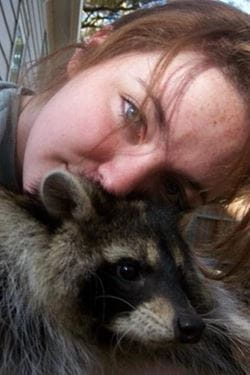 Geddes started out working with animals before shifting to human medicine. She then thought about specializing in emergency medicine but gravitated toward complex cases in the neonatal intensive care unit. After earning her medical degree from the University of Illinois, she entered a pediatric residency program at Advocate Hope Children’s Hospital on the south side of Chicago.
Geddes started out working with animals before shifting to human medicine. She then thought about specializing in emergency medicine but gravitated toward complex cases in the neonatal intensive care unit. After earning her medical degree from the University of Illinois, she entered a pediatric residency program at Advocate Hope Children’s Hospital on the south side of Chicago.
“It was a small program with just 13 people per class, and there was not a lot of exposure to genetics in my residency,” Geddes said. “My favorite part was always morning report, where a mystery case was presented for us to figure out. Everyone in my residency knew I should be a subspecialist, but no one knew what kind.”
Geddes eventually realized she was destined to be a geneticist and did post-residency training in medical genetics and genomics at the Medical College of Wisconsin.
“As I met people in genetics, I realized these are my people,” she said. “This is where I fit in.”
Her peers from residency—now practicing pediatricians—still call her with their genetics questions, and she frequently consults with physicians of other specialties.
“I love being a ‘doctor’s doctor,’” she said. “Genetics touches every specialty.”
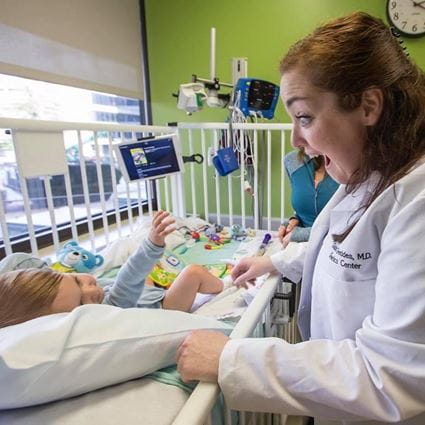 Geddes develops standardized protocols for genetic testing in infants with congenital heart disease and advocates for implementation statewide.
Geddes develops standardized protocols for genetic testing in infants with congenital heart disease and advocates for implementation statewide.
“She has been instrumental in cutting-edge treatment of patients with rare cardiovascular genetic conditions,” said Stephanie Ware, MD, PhD, program leader in cardiovascular genetics at the Herman B Wells Center for Pediatric Research at IU School of Medicine. “In multiple cases, the prompt recognition and treatment of the rare genetic condition has been lifesaving.”
Last year, Geddes earned a certificate in clinical informatics, fueled by her desire to incorporate genetic information into patients’ electronic health records. She will be taking more classes starting this summer.
“Simply stated, Dr. Geddes is a leader in the field of medical and cardiovascular genetics,” said Larry Markham, MD, division chief of pediatric cardiology and the Phillip Murray Professor of Pediatric Cardiology at IU School of Medicine. “She is a compulsive clinician with attention to detail and a focus on the patient and family.”
Finding her way
In her teen years, Geddes didn’t think much about her future. Her day-to-day was more about survival. When she was 12, her mother was diagnosed with primary progressive multiple sclerosis, a neurodegenerative disease that interferes with the brain’s ability to control the body.
“She became bedridden overnight,” Geddes said. “I ended up functionally parenting my little sister—I registered her for school and drove her to gymnastics. We did a lot of things to help take care of my mom like injections and home infusions, so we were exposed to medical care in that way.”
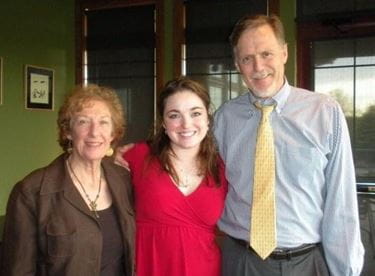 Her sister is now a Doctor of Physical Therapy, which Geddes counts as a “parenting success.”
Her sister is now a Doctor of Physical Therapy, which Geddes counts as a “parenting success.”
Geddes’ late high school years, however, were challenging. During her senior year, she became homeless and was taken in by a couple she refers to as her foster parents. Her sister subsequently went to live with relatives out of state. Although the separation was emotionally difficult, it was the first time Geddes was free to think about her own life plans.
“I only applied to one college,” she said. “I thought I would take care of my sister until she graduated from high school. I didn’t have a clear picture or dream of the future.”
When Geddes started college at Northern Illinois University, her initial thought was to become a high school biology teacher. It was her part-time job as a vet tech that changed her course.
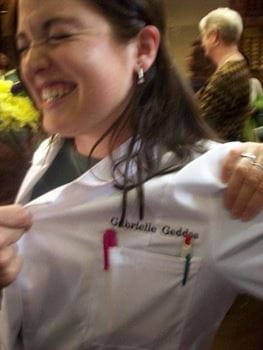 “One of the veterinarians was a strong mentor,” she said. “One evening coming home from a house call, he told me that he thought I should become a doctor—granted, he meant a veterinarian.”
“One of the veterinarians was a strong mentor,” she said. “One evening coming home from a house call, he told me that he thought I should become a doctor—granted, he meant a veterinarian.”
At each step in her winding journey toward becoming a cardiovascular geneticist, things came into focus at the last minute, said Geddes.
“The moral of the story is you don’t have to have everything figured out to end up in the right place,” she said.
Joining a team
Geddes finds medical genetics “intellectually satisfying and invigorating.” But for much of her early career on faculty with the Medical College of Wisconsin, she felt alone.
“In Milwaukee, I self-trained to be a cardiovascular geneticist,” Geddes said. “There was no one else on campus that I could talk to on a deeper level who understood it like I did. I got sort of lonely.”
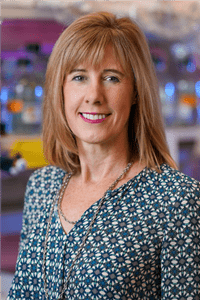 That changed when she reached out to Ware, Indiana’s other cardiovascular geneticist. Ware invited Geddes to participate in a research collaborative–her first formal, multi-institutional project.
That changed when she reached out to Ware, Indiana’s other cardiovascular geneticist. Ware invited Geddes to participate in a research collaborative–her first formal, multi-institutional project.
“I’ve always called her my research soulmate,” Geddes said. “We have opposite personalities and attack problems from different ways, but we have the same research interests and usually come to the same conclusions. Stephanie is someone who can really challenge me and make me a better cardiovascular geneticist.”
Ware, now interim chair for the Department of Medical and Molecular Genetics, recruited Geddes to IU in 2019. The two now work together in the Cardiovascular Genetics Program at Riley Hospital for Children at IU Health.
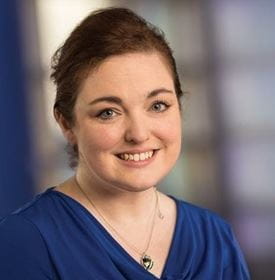 “Elle has been very instrumental in the growth of our cardiovascular genetics program,” Ware said. “She is a strong advocate for patients. She is also a great teacher and is associate director of our genetics residency program. I know many of the subspecialists in Riley have benefitted from her knowledge and care for patients with complex medical problems. She makes genetics more accessible for patients and providers alike.”
“Elle has been very instrumental in the growth of our cardiovascular genetics program,” Ware said. “She is a strong advocate for patients. She is also a great teacher and is associate director of our genetics residency program. I know many of the subspecialists in Riley have benefitted from her knowledge and care for patients with complex medical problems. She makes genetics more accessible for patients and providers alike.”
Geddes is thrilled to be part of a team that values her passion for medical genetics.
“It’s really satisfying to be part of such a culture of interdisciplinary cooperation and teamwork,” she said.
Fulfilling her calling
Geddes sees her career in medical genetics as a calling.
“I really like my job, so I spend a lot of time thinking about cardiovascular genetics when I’m off,” she said. “When people say you have no work-life balance, I say, ‘Would you tell a nun she has no work-life balance?’ This is a calling. This is what I was meant to do.”
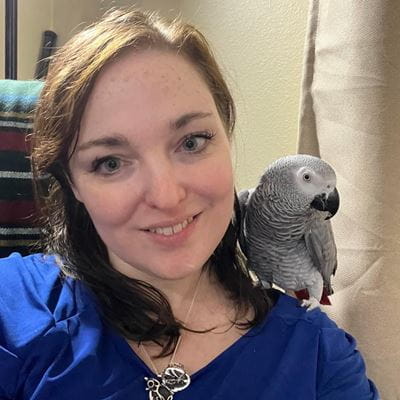 Geddes lives with a Yorkshire terrier named Maisy, an African gray parrot named MacGyver and a small parrotlet, Izel.
Geddes lives with a Yorkshire terrier named Maisy, an African gray parrot named MacGyver and a small parrotlet, Izel.
“Parrots are my favorite type of pet—they’re really cool, intelligent and interesting,” she said. “They’re somewhat exotic and niche, which describes everything about me.”
She sees animals as symbols of adaptability and perseverance. These are traits Geddes embodies as she works in the emerging field of medical genetics. While the Human Genome Project was completed in 2003, it contained gaps; the first complete sequence of an entire human genome was published just last year.
“I’m eager to see the evolution of using genomic medicine to guide treatment and therapy instead of just having an answer for the presenting issues,” she said.
Geddes created a Facebook group to connect female medical geneticists. It now has over 250 members—more than 10% of the number of medical geneticists in the United States.
At IU, Geddes works with other medical geneticists to help solve medical mysteries.
“We’ve had some fascinating PICU (pediatric intensive care unit) cases where the genetic diagnosis not only solved the case, but it really changed therapy for a patient because of that diagnosis,” Geddes said.
Those wins for patients keep her invigorated.
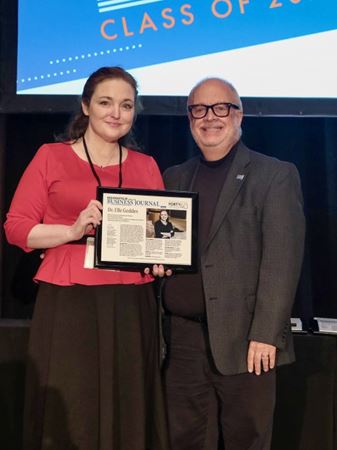 “Dr. Geddes bridges gaps between specialists from different disciplines to accelerate the collaborative process in caring for the most complex of all patients,” said Brian Gray, MD, a pediatric surgeon who works with Geddes at the Riley Heart Center and Riley Fetal Center caring for children with congenital heart disorders. Like Geddes, he was named to IBJ’s Forty Under 40 in 2020.
“Dr. Geddes bridges gaps between specialists from different disciplines to accelerate the collaborative process in caring for the most complex of all patients,” said Brian Gray, MD, a pediatric surgeon who works with Geddes at the Riley Heart Center and Riley Fetal Center caring for children with congenital heart disorders. Like Geddes, he was named to IBJ’s Forty Under 40 in 2020.
Although Geddes isn’t a surgeon, she searches out new surgical and medical techniques that might improve outcomes for patients with genetic anomalies.
“Kids with genetic conditions often struggle more after surgeries, and geneticists and surgeons don’t cross talk enough,” she said.
Not only is Geddes a collaborative colleague, but she’s also an excellent educator who has contributed to 36 publications in the field of medical genetics, noted Markham.
“Elle is a gifted teacher of medical students, residents, fellows and her peers,” he said. “She is able to communicate extremely complex genetic information to families and non-geneticists. She is always willing to volunteer to help, especially when the outcome is improving patient care.”
